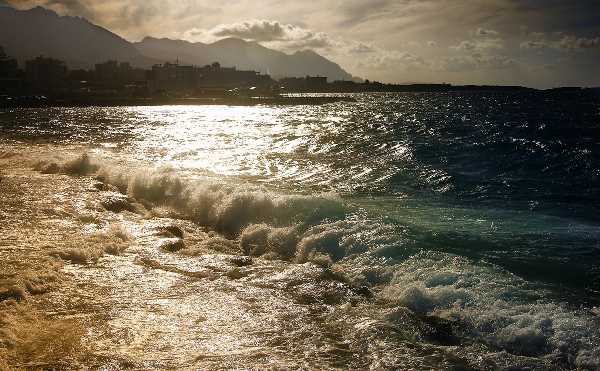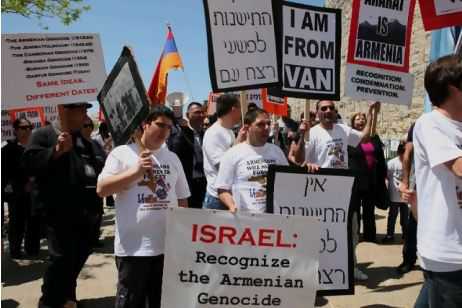The Armenian Weekly conducted an interview today with the ANCA executive director Aram Hamparian. The interview focuses on H.Res 306, the Return of Churches resolution, introduced today. Below is the interview.
Alongside the Armenian Genocide Resolution, there was a new resolution recently introduced in the House of Representatives calling upon Turkey to respect the rights of Christians and to return their stolen churches. Can you tell us more about it?
Well, to begin with, we’re very encouraged by the introduction H.Res. 306—the Return of Churches resolution—by two of the most senior members of the House Foreign Affairs Committee, Ed Royce and Howard Berman, and gratified by the broad, bipartisan support it has garnered.
This religious freedom measure was launched with several dozen original cosponsors, including the co-chairs of the Human Rights, Hellenic, and Armenian caucuses, and, notably, Congresswoman Ileana Ros-Lehtinen, the chairwoman of the House Foreign Affairs Committee.
A reading of the resolution’s text shows that it calls, very simply, upon the government of Turkey to honor its international obligations to return confiscated Christian church properties and fully respect the rights of all Christians, among them, of course, Armenians, Greeks, Assyrians, Pontians, and Arameans (Syriacs) who have lived for thousands of years in what is present-day Turkey.
This legislation speaks to us powerfully as Americans—committed, as we are, to the principle of religious liberty; as Christians—who seek for ourselves and all people the right to worship in freedom; and as Armenians—who are working for a truthful and just resolution of the Armenian Genocide that morally and materially makes whole the victim of this horrific crime. There’s no better place to start this long overdue process than with Turkey returning stolen churches.
Why this resolution now?
This measure is urgently needed to confront—and eventually reverse—the vast destruction visited upon religious sites during the Armenian Genocide as well as Turkey’s official and ongoing, post-genocide destruction of church properties, desecration of holy sites, discrimination against Christian communities, and denial of rights to Armenians, Greeks, Assyrians, Chaldeans, Pontians, Arameans (Syriacs), and others.
It’s adoption would add the powerful voice of the U.S. Congress—and the full moral authority of the American people—to the international defense of religious freedom for the Christian nations residing within the borders of present-day Turkey.
Can you briefly describe the communities and churches this legislation seeks to protect?
Armenians, Greeks, Assyrians, Pontians, and Arameans (Syriacs) have long lived in what is present-day Turkey. Many thousands of years before the establishment of the Ottoman Empire, these nations gave birth to great civilizations and established a rich civic, religious and cultural heritage. They were, upon these biblical lands, among the first Christians, dating back to the time of the travels through Anatolia by the Apostles Thaddeus and Bartholomew. Armenia, in 301 A.D., as is well known, became the first nation to adopt Christianity as a state religion.
As students of religion worldwide know, the territory of present-day Turkey is home to many of the most important centers of early Christianity—most notably Nicaea, Ephesus, Chalcedon, and Constantinople. These lands contain a remarkably rich legacy of Christian heritage, including thousands of religious sites.
And, of course, the Armenian Genocide nearly wiped out these Christian nations.
It’s true. The Armenian Genocide of 1915 and, more broadly, Ottoman Turkey’s genocidal drive to eliminate its entire Christian population, represents a terrible watershed in the histories of the Christians of these lands, marking, as it does, a genocidal shift from the Turkish leadership’s ongoing policy of violence and oppression to one of an outright, systematic, intentional and state-implemented campaign of race extermination.
And so, during the World War I-era, after centuries of growing intolerance and persecution, Ottoman Turkey perpetrated a government-sponsored campaign of genocide against its Armenian and other Christians subjects, resulting in the murder of over 2,000,000 Armenians, Greeks, Assyrians, Pontians, Arameans (Syriacs), and the exile of hundreds of thousands others from their homelands of thousands of years.
The Republic of Turkey, heir to the Ottomans, continued these genocidal policies against the remaining Christian population, through ethnic-cleansing, organized massacres, destruction of churches and religious sites, illegal expropriation of properties, discriminatory policies, restrictions on worship, and other means. As a result only a small fraction of the vast Christian population that once populated Anatolia remains today in modern Turkey.
What is the situation today of remaining Christians within Turkey?
The endangered Christian communities within Turkey’s present-day borders, in addition to all the crimes visited upon them and their holy sites throughout their histories, continue, to this day, to endure oppressive restrictions imposed by the government of Turkey on their right to practice their faith in their historic places of worship. These endangered sites are, nearly all, still today in Turkish hands as a direct result of genocide.
What does the U.S. government—Turkey’s ally—have to say about religious freedom in Turkey?
The State Department, which often goes to great and frequently unreasonable lengths to excuse Turkey’s conduct, has criticized the persecution of Christians in Turkey, including the improper confiscation of their properties.
The U.S. Commission on International Religious Freedom, established by Congress, recently designated Turkey as one of a handful of countries on its watch list for a third consecutive year.
All this reflects the sad reality faced by the remaining Christians in Turkey. They are, all too often, prevented from praying in their historic churches, which have been desecrated, sometimes used as storage sheds—and in some cases, even turned into barns. In very rare instances—such as the Akhtamar Church—Turkey has undertaken repairs, but refused to these return religious properties to their rightful church owners, instead converting them into museums, where prayer, as a rule, is prohibited.
Has Congress taken action on these types of religious freedom issues in the past?
The United States, as a nation that was, quite literally, founded upon a belief in religious liberty, has a long and proud tradition of actively promoting and defending freedom of faith around the world.
Our own Bill of Rights safeguards religious freedom for Americans, and our longstanding leadership in championing the Universal Declaration of Human Rights and other international covenants has helped protect freedom of faith across the globe.
America’s enduring commitment to religious freedom was powerfully reaffirmed in the International Religious Freedom Act of 1998, and has been underscored in countless pieces of specific legislation. Here are a few examples:
- Just last year, the U.S. House passed H.Res.1631, which called for the protection of minority religious communities and places of worship in the illegally-occupied portion of Cyprus.
- S.Res.705, adopted by the U.S. Senate during the 110th Congress, reaffirmed U.S. support for the preservation of religious and cultural sites, and, in particular, called upon the government of Lithuania to halt and, if necessary, reverse the desecration of a Jewish cemetery located in the Snipiskes area of Vilnius.
- H.Res.562, passed by the House during the 105th Congress, cited the confiscation of property by foreign governments as a means of victimizing minority populations, and, specifically, urged foreign governments to return wrongfully expropriated properties to religious communities.
- H.Res.191, which was adopted by the U.S. House during the 109th Congress, called upon the government of Romania to provide fair, prompt, and equitable restitution to all religious communities for church properties that had been previously stolen by the government.
- H.R.3096 from the 110th Congress, put the U.S. House on record pressing the government of Vietnam to respect freedom of religion and to return properties confiscated from churches.
- H.Con.Res.371, passed by the House during the 110th Congress, called on foreign governments to return looted and confiscated properties to their rightful owners or, where restitution was not possible, to pay equitable compensation, in accordance with principles of justice and in an expeditious manner that is just, transparent, and fair.
What type of opposition do you expect to this resolution?
Sadly, if history is any guide, we can look to the Turkish government to stridently oppose this effort to end faith-based discrimination, promote religious tolerance, and secure the rightful return of Christian churches.
This bipartisan measure speaks openly and honestly about the real situation in Turkey today, which inevitably runs up against the many Ottoman and Kemalist myths about Turkey as a model of tolerance and pluralism. So, we’re likely to hear that this measure is unnecessary or even counter-productive given all the great strides that the Turkish government is supposedly making. I wouldn’t be surprised to hear the Turkish Embassy trying to spin that its adoption would somehow upset the fragile Turkey-Armenia Protocols process.
What can our readers do to help move this legislation forward?
The quickest and easiest first step is for folks to send a free ANCA WebMail asking their U.S. Representatives to support the Return of Churches resolution (H.Res.306) and work for its adoption.
Another great way to help is to spread the word to friends, family, work colleagues, and people you know who attend churches, mosques, synagogues, and other places of worship – basically anyone concerned about religious freedom and human rights. Send them the link www.anca.org/return or just explain in your own words what this effort is all about.
There are so many ways to engage, from getting involved with your local ANCA chapter and visiting with your local legislators to meeting with the editors of your community newspapers, volunteering for supportive candidates, and building coalitions with friendly groups.
There are as many ways to help as there are people who want to be helpful. If people need a hand, we’re here for you. Just send us an email, call, or post a note to our Facebook page.




 A TURKISH decree banning Turkish Cypriot students who study at schools in the government controlled areas from applying to universities there was yesterday slammed by local educationalists.
A TURKISH decree banning Turkish Cypriot students who study at schools in the government controlled areas from applying to universities there was yesterday slammed by local educationalists.
 Le Fleuri Restaurant at Le Meridien Limassol Spa & Resort, Cyprus
Le Fleuri Restaurant at Le Meridien Limassol Spa & Resort, Cyprus
 Sparkling Sea at Cyprus – Courtesy Charles Pieters
Sparkling Sea at Cyprus – Courtesy Charles Pieters

 Lagoon Pool of Le Meridien Limassol by Smolyarchuk Irina – hotel photo contest image
Lagoon Pool of Le Meridien Limassol by Smolyarchuk Irina – hotel photo contest image
 Late summer sun at Girne – Courtesy Ulrich Kersting
Late summer sun at Girne – Courtesy Ulrich Kersting
